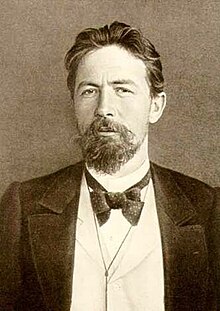Without expenses
Without display ( Russian Хороший конец , Choroschi konez ) is a short story by the Russian writer Anton Chekhov , which appeared on July 25, 1887 in the weekly Oskolki . During the author's lifetime the text was translated into Bulgarian, German, Polish, Romanian, Serbo-Croatian, Czech and Hungarian. In a review in the Kiev magazine Leben und Kunst in January 1900, Alexander Kuprin certified that the humorist Chekhov was a talented writer of anecdotal stories.
content
In a Russian city: The 52-year-old head conductor Stytschkin wants to finally get married. Because he doesn't know a suitable woman, he has forced the 40-year-old matchmaker Lyubow Grigoryevna, "a solid, somewhat vague lady", to come to his home. In this first exploratory conversation, the railway official is actually quite undemanding regarding his happiness in life. With a simple girl who respects him, he would like to have a few children and nothing more. This woman doesn't have to be rich, but she shouldn't be poor either. A full figure of this lady would be pleasant. Beauty passes, says Stychkin. So a woman's appearance does not play the first role in his choice. His future does not have to have an understanding either. The main thing is that she can sew a button on him. The matchmaker Lyubov Grigoryevna sighs and offers the officer a Greek woman and a French woman. Stytschkin declines with thanks and searches for the displays. What does the marriage agency cost? The visit costs twenty-five rubles.
The officer thinks that is expensive. When he found out during a conversation that his visit to the ladies managed an average of two placements per month, he calculated nimbly: six hundred rubles a year - that's a good match. Stychkin proposes marriage to Lyubov. The woman accepts, blushing. Anton Chekhov closes the story: "He ... began to explain to his bride his views on marriage and the duties of women."
Web links
- The text
- online in the Gutenberg-DE project
- Without expenses . Pp. 290-297 in A Known Gentleman. Humorous stories. Only authorized translation from Russian by Vladimir Czumikow . Book decorations by J. Frieslander . Eugen Diederichs , Leipzig 1901. online in the Russian State Library (German)
- Wikisource: Хороший конец (Чехов) (Russian)
- online in Lib.ru (Russian)
- online in FEB (Russian)
- Chekhov Bibliography, Entry Stories No. 495 (Russian)
- Reference to first appearance in the Laboratory of Fantastics (Russian)
